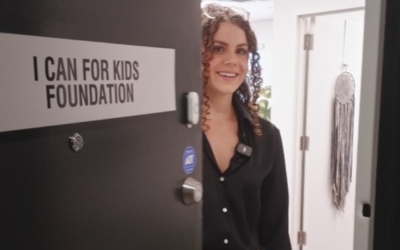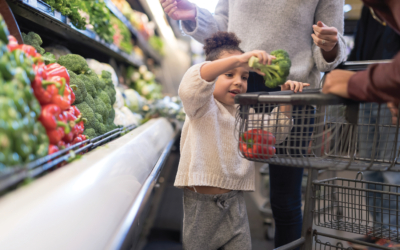As soon as I Can for Kids (iCAN) published a blog on the unique struggles of living with both food insecurity and Tourette Syndrome, we started to receive questions about the number of families participating in our program who also live with a disability. Our agency partners estimate that:
- about 15% of the parents in Calgary who access our grocery gift cards have a physical disability
- 15% of the food-insecure families we support are raising at least one child with a physical disability
- 28% of our recipients have at least one child with a cognitive, neurological, or learning disability
What’s the relationship between food insecurity and disabilities?
The research hasn’t yet uncovered a clear answer to this question because most of the studies define disability in very different ways. However, experts do know that the presence of a household member with a physical or mental disability increases the odds of experiencing food insecurity across our country. Researchers generally describe a disability as a short-term, long-term, or permanent limitation that affects a person’s capacity to perform daily activities of life due to:
- injury or disfigurement
- impaired cognitive skills
- neurological conditions
- poor physical mobility
- barriers to learning or memory
- physical health issues and symptoms
- mental illness or trauma
- impaired speech, hearing, or sight
People with disabilities identify several key reasons that they are at higher risk for living on a low income and experiencing food insecurity, including:
- inability to work full time to earn enough money
- barriers to finding a job due to discrimination
- higher healthcare, medication, and treatment expenses
- increased costs of living related to the need for accessible housing, disability aids, personal assistants, and adaptive equipment
- expensive diet treatments or recommendations
- difficulty accessing or qualifying for government benefits and programs
- needing to pay for grocery delivery services due to mobility barriers
- inability to predict and follow a steady budget to cover the fluctuating costs of all their unique needs
How much more likely are people with disabilities to become food insecure?
An individual or family is more likely to experience food insecurity when their disability prevents them from securing or maintaining regular employment. The lower their income, the harder it becomes for them to afford all their basic needs. A household that is home to multiple people with disabilities is even more likely to become food insecure. Recent studies in Canada show that:
- mobility-impaired adults face twice the risk of becoming food insecure (although the good news is that the current rates of government disability benefits in Alberta appear to offer greater protection in comparison to other provinces)
- individuals aged 16 years and older are twice as likely to experience severe food insecurity if they have a disability
- adults with functional impairments caused by serious health issues are five times more likely to experience food insecurity than adults without any impairments
How do grocery gift cards help families with disabilities?
It’s often much more difficult for households with disabilities to navigate or travel to grocery stores, especially during extreme weather. Families living with a disability expend much more time and energy to accomplish what many of us perceive as simple tasks, such as grocery shopping. During times of increased struggle, parents appreciate the option to use our gift cards to ask friends and family for help, or to place online food orders for pick-up or delivery. By making access to essential groceries much less arduous, our program creates a ripple effect of greater independence, increased stability and safety, and reduced stress.
We recently encountered a single mom with three children who couldn’t work for several months while she healed from a short-term disability caused by a major injury. Within days of accessing our program, she sent us a note of reassurance:
“As I heal my broken foot and begin to walk, food insecurity has been a stress mitigated by your support. Without agencies like yours, my family would suffer. Especially right now with inflation and the way food costs keep going up! The grocery gift cards give the kids nourishment and the ability to focus on the important things like growing and school! I can honestly say the support while I’ve been recovering has been astronomical to my family, including the kind words and check-ins from the friendly agency staff. Thank you again and again!”
When you donate today, you restore a vital sense of security for food-insecure children and families with disabilities who face additional barriers to accessing enough healthy food.
To join iCAN’s expanding list of donors, sponsors, and champions, check out the different ways you can get involved or donate.
To learn more about I Can for Kids and their unique approach to childhood food insecurity, visit www.icanforkids.ca
About Donald Barker
Donald Barker has worked as a registered dietitian for more than 25 years. He also has a professional background in communications and has long advocated for populations who face adverse, unjust, or systemic barriers that lead to higher rates of poor social, mental, emotional, and physical health outcomes. Donald currently volunteers as an Advisor with iCAN to support our transition towards evidence-based approaches that help improve the well-being of children in Calgary who live in low-income and food-insecure households.
About I Can for Kids Foundation
I Can for Kids works closely with multiple agency partners to target and distribute grocery gift cards to food-insecure families who are most in need. The iCAN grocery gift card program is a more dignified and inclusive approach to dealing with food insecurity, allowing families to shop where everyone else shops and to choose foods that are appropriate for their health and cultural needs. Explore their website to discover more about iCAN’s impact over the years.
For more information and media inquiries, please contact iCAN Executive Director, Bobbi Turko at bobbi@icanforkids.ca.




